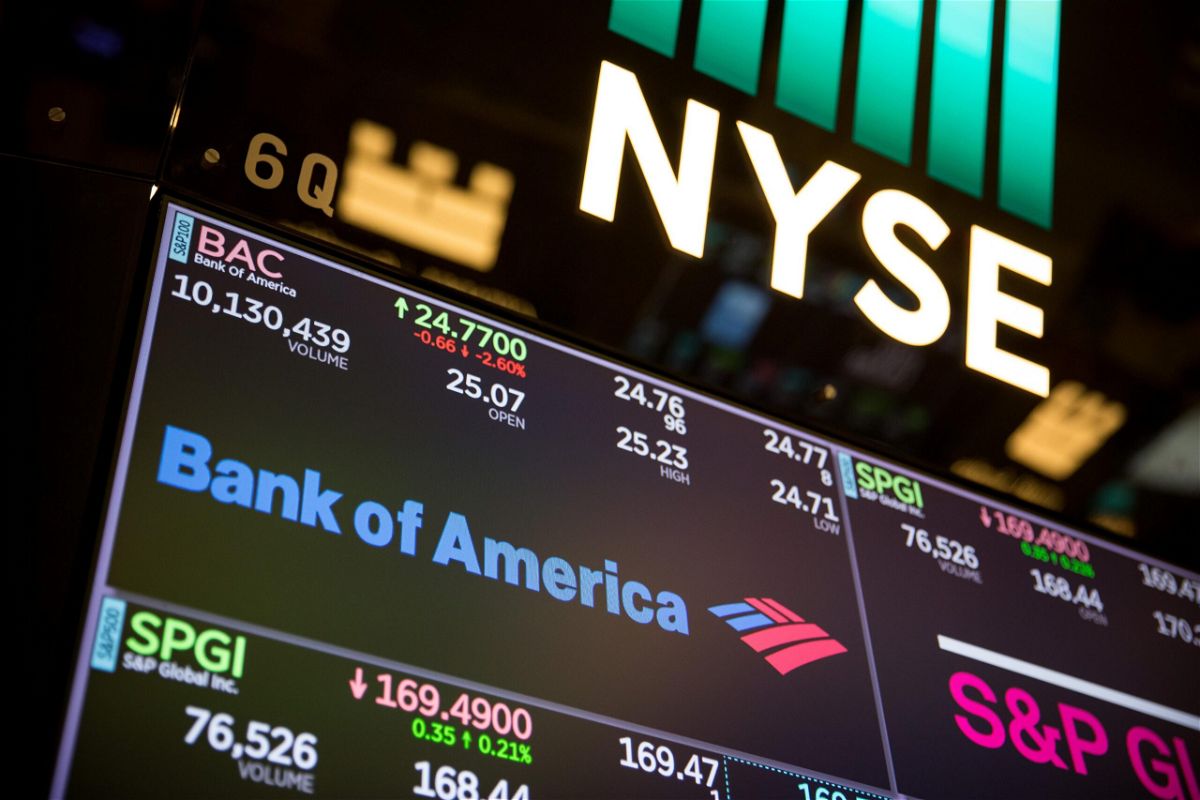Trying to make sense of the Omicron market? Look at bank stocks

Shares of lenders like Bank of America
By Julia Horowitz, CNN Business
If you want to determine where investors think the economy is heading, it makes sense to turn to shares of banks.
Traditionally, banks boom during times of expansion and get hit hard during contractions as customers struggle to repay debts. They’re also extremely sensitive to interest rates, which affect how much money banks can earn off loans.
What we’re seeing: Shares of lenders like Bank of America, JPMorgan Chase and Wells Fargo were whipsawed when news about the Omicron variant first hit. But they’ve leaped over the past two trading sessions, as Wall Street has decided to brush off its pandemic fears.
If traders are correct, the way could once again be clear for central banks to take steps to rein in inflation without tanking the economy.
At an industry conference on Tuesday, Bank of America CEO Brian Moynihan said consumer spending remains extremely high and he has yet to see an impact from the Omicron variant.
“We’re not seeing any behavior change here,” he said.
Wells Fargo CEO Charles Scharf also predicted that spending would stay strong in 2022. He emphasized that it’s not just rich customers who still have cash on hand.
“Consumers have … 30%, 35% more today in their deposit accounts than they had pre-Covid,” Scharf said. “It’s pretty consistent across all wealth levels. So it’s not just the affluent. It’s those that started with very low balances in their account.”
There were concerns when Americans’ optimism about their own finances and the overall economy fell to a decade low in November, John Heagerty, an analyst at Atlantic Equities, told me. Recent polls suggest many people still feel pretty gloomy about the outlook.
But executives leading the nation’s banks are pointing to the gap between concerns about issues like inflation and actual behavior.
“Bank CEOs are saying, ‘Judge consumers by their actions, not their words,'” Heagerty said. “Consumers are spending a lot of money even if they claim they’re not particularly happy.”
Should the economy remain strong despite the arrival of the Omicron variant, the Federal Reserve could begin raising interest rates shortly.
“Our view is interest rates will rise next year multiple times and beginning sort of midyear, even maybe a little bit earlier,” Moynihan said.
If interest rates were due to increase but the economy was getting weaker, banks would be worried. But for now, they maintain that’s not the case.
Yet lenders will be watching what happens next closely, given the ongoing risk of a policy mistake as the Fed tries to accelerate the pace at which it pulls unprecedented levels of stimulus.
“If the Fed raises rates too quickly, that could cause the economy to tip into recession, which would be bad for the banks,” Heagerty said.
In short: Investors will keep snapping up US bank shares, which are up 38% this year, if they believe the economy will hold up and the Fed can effectively manage its next moves. That’s certainly been the case this week.
But analysts are on guard for what happens next. Bank shares are down slightly in premarket trading on Wednesday.
Instagram’s chief will testify before lawmakers
Meta, formerly known as Facebook, has recently generated a long list of negative headlines. But one issue has been of particular concern to regulators: the safety of children on its Instagram app.
The latest: Instagram chief Adam Mosseri will answer questions on the subject before a Senate subcommittee on Wednesday. Lawmakers are expected to grill Mosseri on the app’s impact on young users’ mental health and potential solutions.
Ahead of the hearing, Instagram rolled out a handful of new features aimed at making it harder for users, particularly teenagers, to get lost in an infinite scroll.
On Tuesday, the company launched Take a Break, a setting that will encourage users to spend some time away from the platform after they’ve been using it for a certain period. Users can turn on the feature and select if they want to be alerted after using the platform for 10 minutes, 20 minutes or 30 minutes. They’ll then get a full-screen alert telling them to close out of the app, suggesting they take a deep breath, check a to-do list or listen to a song.
My CNN Business colleague Samantha Murphy Kelly tested the feature ahead of its launch. She reports that while it’s a step in the right direction, there’s still room for improvement.
For example, users have to stay on the platform for one continuous session. If the app closes while you run to the bathroom or the screen turns off while you briefly browse Netflix, the timer resets. And after the prompt encourages a break, the onus is on the user to resist returning to the app.
Instagram also said it will take a “stricter approach” to the content it recommends to teenagers and actively nudge them toward different topics if they’ve been dwelling on something for too long.
Investor insight: Facebook’s shares are up 18% this year, lagging the S&P 500, which is nearly 25% higher. It performed better than Amazon during this period, but is well behind Big Tech names like Microsoft, which has gained about 50%, and Google parent Alphabet, which has rallied 68%.
Can you move the work week? Dubai just did
Workers in the United Arab Emirates and Dubai, its international finance hub, are going to have to adjust to a different work schedule.
The Gulf state, in a first for the region, announced this week that it’s switching to a four-and-a-half-day work week ending at midday Friday to make it easier to do business globally.
The move away from the current Sunday-to-Thursday schedule will help the UAE “achieve business continuity and alignment with global economies and banking,” the government said in a statement. The change will take effect on Jan. 1, and will apply to government employees and schools.
The UAE, which has a predominantly Muslim population, said that work will end at 12 p.m. local time on Friday to allow people to attend prayers. Friday is considered the holiest day of the week for Muslims.
While smoothing business ties around the world, the shift will mean the UAE is no longer synchronized with neighbors such as Saudi Arabia, Qatar and Kuwait. Other predominantly Muslim countries — including Indonesia, Turkey, Morocco and Malaysia — have adopted a Monday-Friday schedule, however.
Locals are scrambling to digest the news. The Wall Street Journal reports that restaurants are worried that extravagant Friday brunches, which have become something of an institution, could now be in jeopardy.
Saturday brunch “doesn’t sound as glamorous,” Adrian John, who runs a restaurant-review website dedicated to Friday brunch, told the paper.
Up next
Campbell Soup reports earnings before US markets open. GameStop follows after the close.
Also today:
- US job openings for October arrive at 10 a.m. ET, providing insight into ongoing worker shortages.
- The Senate hearing on how Instagram protects child safety kicks off at 2:30 p.m. ET.
Coming tomorrow: Earnings from Costco, Broadcom and Chewy.
The-CNN-Wire
™ & © 2021 Cable News Network, Inc., a WarnerMedia Company. All rights reserved.


